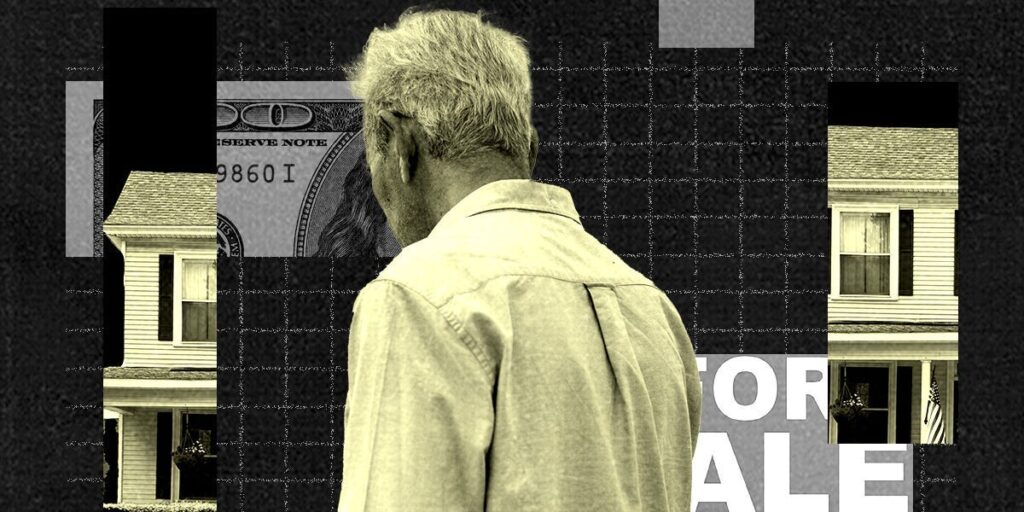- Older people, including homeowners, are increasingly facing housing insecurity.
- The phenomenon is in part due to housing shortages, inflation, and an aging population.
- Some homeowners told BI they live in fear of losing their properties.
Owning a home has long been a pillar of the American dream, but for many older homeowners, it’s no longer providing the retirement security it once did.
Many baby boomers are struggling with rising home repair costs, insurance premiums, and property taxes while also facing a scarcity of affordable retirement housing options. And working all their lives isn’t enough to prevent a growing number of older people from experiencing homelessness.
Rising rents and home prices, largely caused by a housing shortage and other cost-of-living spikes, are hitting older adults especially hard. Overall homelessness surged to its highest level on record last year, according to the federal government’s most recent count conducted in January 2024. And older people make up a growing share of those losing their homes: The portion of homeless single adults 50 or older is estimated to have grown from about 10% to 50% over the past three decades.
“The cost of housing and the cost of everything, quite frankly, is getting more and more expensive,” Marcy Thompson, vice president of programs and policy at the National Alliance to End Homelessness, told Business Insider. “And this is particularly true for older adults who are on fixed incomes.”
Homeowners on the brink of homelessness
Valerie Miller, 67, has owned her mobile home in San Bernardino, California for almost 35 years, but she’s still struggling to pay rent for the plot her home sits on and can’t afford needed repairs and maintenance.
Miller, who never married or had children, is planning to wait until she’s 70 to collect Social Security but has already begun dipping into her meager retirement savings and worries she’ll never be able to leave her job at a truck-permitting company. Miller has considered selling her home, but she doesn’t know where she could find more affordable housing.
“Sometimes I lie awake at night and I’m so worried,” she said. “I don’t want to use up all my savings, and then what do I do? Live off credit cards or go with the homeless people?”
The increase in homelessness among older Americans is a result both of demographic shifts — the baby boomer generation is getting older — and rising housing and other costs. The number of older homeowners and renters who spend more than 30% of their income on housing costs has surged in recent years.
Allison Nickerson, executive director of LiveOn NY, a nonprofit group focused on improving living conditions for aging people, argued that Americans tend to underestimate the number of older people suffering. A fifth of Americans 50 and older have no retirement savings.
“There’s this feeling that baby boomers and older people are pretty comfortable,” she said. “But when you actually look at the the amount of people who are struggling, and then looking at the cost of living that has gone up, inflation that’s gone up, people are just getting left behind.”
Barbara Willing, 69, an artist who’s worked on and off at Walmart and Lowe’s, has struggled to make a steady income in recent years as she suffers from an autoimmune disease. She bought her home in Victor, Montana — a small town 35 miles south of Missoula — more than twenty years ago and is still paying off her mortgage.
“I have to keep the place I’m in, even though it’s inadequate in a lot of ways, because to move would cost me so much more,” Willing said, noting that her home has electrical and plumbing issues. She said that the fear of losing her home “continues to loom and gnaw on my conscience and nerves.”
Willing has been out of work since July and is looking for her next sales job, but she worries her aging car won’t last long traveling the nearly two-hour roundtrip commute to Missoula should she find a job there. Without any retirement savings, she said she’s relying largely on her small Social Security checks, a local food bank, SNAP, and disability benefits to make ends meet.
“I’ve gotten over the anguish, the humiliation of having to go to the food bank,” she said. “I actually like going there now, and I tell them how great they’re doing.”

